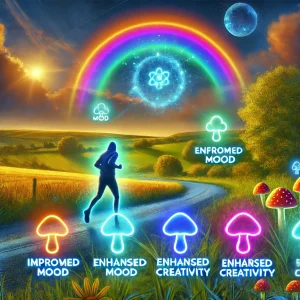Introduction:
- Opening Hook:
- Start with a compelling statistic or recent study highlighting the mental health crisis in the UK, particularly the rise in antidepressant prescriptions. Introduce the concept ofpsilocybin therapy UK as a revolutionary alternative that’s gaining traction.
- Brief Overview:
- Provide a quick summary of what psilocybin is and its potential to challenge traditional antidepressants in the UK mental health landscape. Mention that the article will delve into the science behind psilocybin and how it compares to traditional treatments. buy psilocybin here to resolve your depression and anxiety issues
Section 1: Understanding the Science of Psilocybin
- How Psilocybin Affects Brain Chemistry
- Explain the basics of how psilocybin interacts with the brain’s serotonin receptors, particularly focusing on the Default Mode Network (DMN) and neuroplasticity.
- UK Angle: Reference studies from UK institutions, such as Imperial College London, which have contributed significantly to understanding psilocybin’s effects on the brain.
- Psilocybin and Neuroplasticity
- Discuss how psilocybin promotes neuroplasticity, potentially leading to lasting changes in brain function that could alleviate depression and anxiety.
- SEO Tip: Incorporate keywords like “psilocybin neuroplasticity UK,” “brain changes with psilocybin,” and “psilocybin mental health research UK.”
- The Serotonin Receptor and Emotional Processing
- Explore how psilocybin’s interaction with serotonin receptors can lead to improved emotional processing and reduced symptoms of depression.
- UK Angle: Mention any UK-led research that has explored the role of serotonin in mood regulation and how psilocybin could offer new insights.
- Long-Term Effects of Psilocybin Use
- Provide an overview of what is currently known about the long-term effects of psilocybin use, both positive and negative.
- UK Angle: Include ongoing UK research efforts to understand the long-term implications of psilocybin therapy.
Section 2: Comparing Psilocybin to Traditional Antidepressants
- Efficacy of Psilocybin vs SSRIs
- Compare the effectiveness of psilocybin therapy with that of traditional SSRIs (Selective Serotonin Reuptake Inhibitors), which are commonly prescribed in the UK.
- SEO Tip: Use keywords like “psilocybin vs SSRIs UK,” “antidepressant alternatives UK,” and “psilocybin depression treatment UK.”
- Onset and Duration of Effects
- Discuss how quickly psilocybin takes effect compared to traditional antidepressants and how long the benefits last.
- UK Angle: Highlight the potential for psilocybin to offer a faster, more effective treatment option, reducing the time UK patients spend in distress.psilocybin therapy UK
- Side Effects: Psilocybin vs Antidepressants
- Compare the side effects of psilocybin with those of traditional antidepressants, noting that SSRIs can cause emotional blunting, weight gain, and sexual dysfunction, whereas psilocybin’s side effects are generally temporary and occur during the therapy session.
- SEO Tip: Include phrases like “psilocybin side effects vs antidepressants,” “antidepressant alternatives side effects,” and “UK psilocybin therapy safety.”
- Long-Term Outcomes: Psilocybin vs Traditional Antidepressants
- Analyze the long-term outcomes for patients using psilocybin versus those on traditional antidepressants, including the potential for reduced dependency on medication.
- UK Angle: Mention any UK-based follow-up studies tracking the long-term effects of psilocybin therapy on depression and anxiety.
Section 3: The Growing Case for Psilocybin in the UK

- Current UK Research on Psilocybin
- Provide a detailed overview of ongoing research efforts in the UK, focusing on institutions like Imperial College London, which are leading the way in psilocybin studies.
- SEO Tip: Utilize keywords like “UK psilocybin research,” “psilocybin studies London,” and “psilocybin clinical trials UK.”
- Public Opinion and Legal Considerations
- Discuss the shifting public opinion in the UK regarding psilocybin and the current legal status. Highlight any movements or campaigns pushing for legalization or medical use.
- UK Angle: Emphasize how UK public sentiment is evolving and the potential impact on future healthcare policies.
- Psilocybin’s Role in the Future of UK Mental Health Treatment
- Explore predictions on how psilocybin might integrate into the UK’s mental health treatment landscape, potentially as a mainstream alternative to antidepressants.
- SEO Tip: Include terms like “future of psilocybin UK,” “psilocybin mental health future,” and “UK antidepressant alternatives.”
Section 4: Real-Life Impact: Patient Stories and Testimonials

- Patient Testimonials: Psilocybin vs Antidepressants
- Share stories from UK patients who have experienced both psilocybin therapy and traditional antidepressants, emphasizing the differences in their outcomes.
- UK Angle: Focus on UK-based testimonials, highlighting the real-world impact of psilocybin therapy on individuals’ lives.
- Case Studies: Psilocybin for Treatment-Resistant Depression
- Present case studies where psilocybin has been used successfully to treat patients with treatment-resistant depression in the UK.
- SEO Tip: Use keywords like “psilocybin treatment-resistant depression UK,” “psilocybin therapy success stories,” and “UK psilocybin depression case studies.”
Conclusion:
- Summary of Key Points
- Recap the main differences between psilocybin and traditional antidepressants, emphasizing the potential benefits for UK patients.
- Call to Action
- Encourage readers to stay informed about psilocybin research in the UK, perhaps by subscribing to a newsletter, following relevant UK research institutions, or supporting advocacy groups.
SEO Strategy:
- Keyword Optimization:
- Focus on long-tail keywords that incorporate UK-specific search intent, such as “psilocybin therapy UK,” “psilocybin vs SSRIs UK,” and “UK mental health psilocybin.”
- Internal Linking:
- Link to other relevant articles on your site, such as those covering legal status, microdosing, or specific mental health conditions treated with psilocybin.
- External Linking:
- Link to authoritative UK-based research studies, news articles, and legal resources to establish credibility and provide further reading.
- Content Length and Depth:
- Ensure the article is comprehensive, ideally exceeding 2,000 words, to cover all aspects thoroughly and improve chances of ranking for multiple related keywords.
- Visuals and Infographics:
- Include visuals such as brain diagrams showing how psilocybin affects the brain compared to SSRIs, as well as infographics summarizing key differences.psilocybin therapy UK
- User Engagement:
- Incorporate a comments section or a way for readers to share their thoughts and experiences with psilocybin therapy, enhancing user engagement and on-page time.
